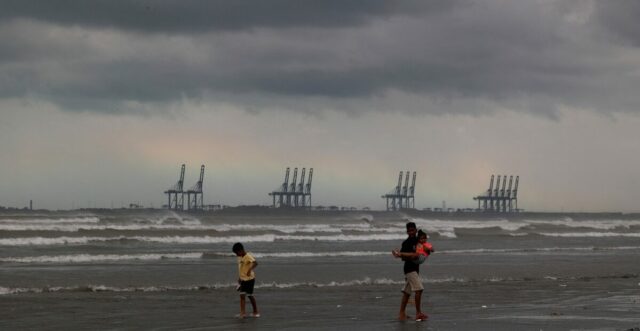In Pakistan, heavy rains and stormy winds forced authorities in the country’s largest city, Karachi, to close schools on Friday, after a deep depression in the Arabian Sea that the weather office says could develop into a cyclonic storm.
Parts of Karachi received 147 mm (5.79 inches) of rain overnight, the local weather office said, and the city’s mayor, Murtaza Wahab, in a post on X, asked residents to avoid
“unnecessary movement”.
The deep depression which is off the Rann of Kutch in India’s Gujarat, is expected to intensify into a cyclonic storm on Friday, India’s weather office said, adding that it would
move north-west over the Arabian Sea in the next two days.
Authorities in Pakistan asked fishermen and sailors not to venture out to sea, and warned that the storm is likely to result in flooding in cities as well as flash floods in hilly
areas in coming days.
More than 28 people died and around 18,000 have been evacuated since Sunday from cities near the Gujarat coast, disaster management authorities said on Thursday, even as more rain was expected in the state as the cyclonic storm builds up.
The formation of a cyclonic storm over the Arabian Sea in August was a rare occurrence, the Indian Express newspaper reported, saying the last such storm was in 1964.
Pakistan is no stranger to natural calamities. Two years ago, massive floods caused damage of between $15 and $20 billion and the government estimated that 12 million people slipped into poverty following loss of jobs and displacement.
Over 600,000 small businesses, a least half of them in Sindh province in western Pakistan, were affected which means more than six million people were virtually destitute.
The loss to Pakistan’s GDP was estimated at over 3%, high for a country with a small industrial base, a largely agrarian economy and masses of unemployable graduates entering the market every year.
With Reuters inputs
Thirty eight years in journalism, widely travelled, history buff with a preference for Old Monk Rum. Current interest/focus spans China, Technology and Trade. Recent reads: Steven Colls Directorate S and Alexander Frater's Chasing the Monsoon. Netflix/Prime video junkie. Loves animal videos on Facebook. Reluctant tweeter.





